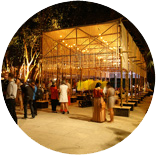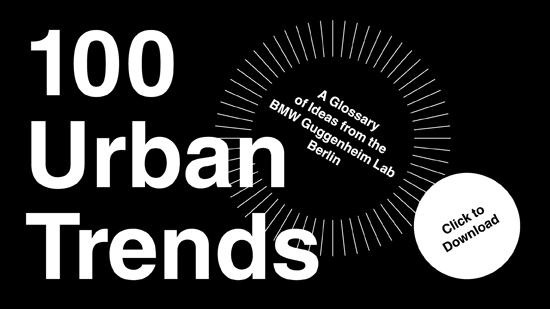News Release
BMW Guggenheim Lab Publishes
100 Urban Trends: A Glossary of Ideas from the BMW Guggenheim Lab Berlin
Lab Advances Public Conversations about Urban Life through Ongoing Projects in Berlin and Online
BERLIN, November 7, 2012 – Today the BMW Guggenheim Lab announced the publication of 100 Urban Trends: A Glossary of Ideas from the BMW Guggenheim Lab Berlin, which offers important resources and insights on urban life. Developed by BMW Guggenheim Lab curator Maria Nicanor and curatorial assistant Amara Antilla through contributions from participants at the Berlin Lab, the glossary features graphic design by award-winning designers Sulki & Min and is available for download in English online on the Lab's website.
The BMW Guggenheim Lab Berlin, a mobile laboratory open from June 15 to July 29, 2012, attracted more than 27,000 visitors on site and 120,000 visitors online. Following its physical departure from the city, the Berlin Lab continues to advance public dialogue about and understanding of urban life.
“We are grateful to the residents, community groups, and urban thinkers who taught us so much during our 33 days of programs in Berlin,” said Lab curator Maria Nicanor. “With our new glossary and the projects we started in Berlin, we aim not only to document and reflect the urban temperature of a particular time and place—Berlin in the summer of 2012—but also to better understand what cities were, are and can be.”
The Berlin Lab-inspired glossary emerged from the experiences and lessons of the Lab’s run, detailing the 100 most talked-about trends, terms, and ideas in urban thinking today. The glossary will be further expanded with terms from the New York Lab and the Mumbai Lab. The compilation of these terms creates a new resource for understanding the way people relate to and live in cities and is intended to advance the concept of the city as a catalyst for ideas.
Three city projects—Dynamic Connections, Free Space Berlin and Make Space—initiated by the Berlin Lab Team continue to engage the public and solicit participation online. These small-scale interventions, which were developed in close collaboration with Berlin-based organizations and individuals, were conceived to kick-start and support urban causes and initiatives. Dynamic Connections, a crowd-sourced, interactive, “safe-cycling” map that allows Berliners to comment on the quality of various biking routes in the city, has received more than 4,000 contributions to date. Free Space Berlin, a mobile workshop and online map project that researches the sale of publicly owned land in Berlin, continues to be a resource for Berlin’s citizens; and Make Space, an ongoing blog, describes and documents the processes for transforming unused lots in Berlin into common meeting spaces for interaction and communication among neighbors. The projects have been featured at Google’s DatenDialog conference and the Eine Welt Eine Zukunft conference, and will be presented at the upcoming “MakeShift” conference at Freie University Berlin in November.
These projects have helped to inform similar participatory projects focused on design that are planned for the Lab’s next stop in Mumbai and online. These include an open competition to develop solutions for a heavily congested traffic junction in Mumbai and an exploration of ways to refit obsolete infrastructure with new public space and pedestrian functions.
“We expected a vibrant public discussion during our time in Berlin, and the city delivered,” stated Richard Armstrong, Director of the Solomon R. Guggenheim Museum and Foundation. “Conversations with participants of the Berlin Lab have yielded important insights that are already informing how we present our global project moving forward.”
“While the physical structure of the BMW Guggenheim Lab has departed, the conversations and ideas generated by the project in Berlin live on,” said Governing Mayor of Berlin Klaus Wowereit. “We look forward to following the Lab’s progress as it continues to make its way around the world.”
The Berlin Lab, located in Prenzlauer Berg in the Pfefferberg complex, offered a range of free, participatory programs, including 97 talks, 101 workshops, 14 screenings, 5 special events, and 27 citywide explorations. These programs, which offered practical ways to empower residents with tools and ideas for shaping their urban environments, have generated lasting contributions for the city.
Part urban think tank, part community center and public gathering space, the BMW Guggenheim Lab is a pioneering global initiative aimed at raising awareness of important urban challenges and inspiring a continuing conversation in cities around the world. The BMW Guggenheim Lab launched in New York City in summer 2011 and will be open in Mumbai from December 9, 2012 to January 20, 2013. Presented in collaboration with the Dr. Bhau Daji Lad Museum, the Mumbai Lab will respond to the unique urban landscape of this bustling city of 13 million by offering free programming at multiple sites throughout the city to engage a wide range of audiences and communities.
In addition to participating in free programs at the Lab sites, the public is invited to visit the project website, to follow the latest activities on the official blog, Lab | Log, to join the BMW Guggenheim Lab’s dedicated social communities on Twitter (@BMWGuggLab and #BGLab), Facebook, YouTube, Flickr, and Foursquare, and to subscribe to the Lab's e-newsletter for project updates.
About the BMW Guggenheim Lab
The BMW Guggenheim Lab is a joint initiative of the Solomon R. Guggenheim Foundation and the BMW Group. The BMW Guggenheim Lab is curated by David van der Leer and Maria Nicanor of the Solomon R. Guggenheim Museum. The graphic identity of the Lab has been developed by Seoul-based graphic designers Sulki & Min.
Awards and Recognition
The BMW Guggenheim Lab has been recognized with a number of prestigious honors, including a Webby Awards nomination for Excellence on the Internet, an International Design Communication Award for Best Logo, and an American Institute of Architects, New York State chapter Citation for Design Excellence. The project has also been recognized by the United Nations as an exemplary project that fosters community participation and discussion about key urban topics. In addition, the Lab was featured as a resource on TED’s website, The City 2.0, recognizing it as a globally ambitious project that seeks to spark dialogue about urban life. Urbanology, a city-planning game on the Lab’s website, was honored with a MUSE Award, presented by the American Association of Museums.
Contacts
Germany:
artpress – Ute Weingarten, Marie Skov
+49 30 4849 6350
This e-mail address is being protected from spambots. You need JavaScript enabled to view it
Kathrin Habermann, Häberlein & Mauerer
+49 89 3810 8165
This e-mail address is being protected from spambots. You need JavaScript enabled to view it
International:
Kate Lydecker, Polskin Arts & Communications Counselors
+1 212 715 1602
This e-mail address is being protected from spambots. You need JavaScript enabled to view it
For complete press materials, go to bmwguggenheimlab.org/presskits
For publicity images, go to bmwguggenheimlab.org/pressimages
For publicity videos, go to bmwguggenheimlab.org/pressvideos
User ID = photoservice, Password = presspass
November 7, 2012
#1269/BGL22


